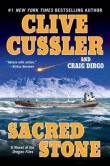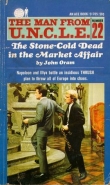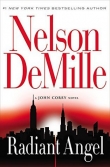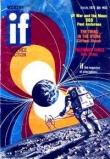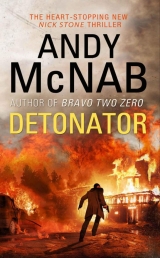
Текст книги "Detonator"
Автор книги: Andy McNab
Жанры:
Триллеры
,сообщить о нарушении
Текущая страница: 19 (всего у книги 23 страниц)
7
I hit the town centre and carried on going, bearing left wherever I could, and took the first exit off a roundabout, which pointed me towards something that called itself the Sant’ Apollinare quay.
I passed what had once been a public park but had morphed into a migrant camp. Families in rags stood round the kind of pop-up tents you see at Glastonbury, or makeshift structures cobbled together from wood, wriggly tin and blue plastic tarpaulins. The human nightmare was shrouded in a haze of woodsmoke as they tried to cook whatever the charities had given them. And these were the lucky ones. The only ones laughing were some of the kids in the swing and slide enclosure.
The only light source on the road down to the quay’s entrance was the massive sign to its left, which announced that this was the place to be if you wanted a ferry to or from Greece.
I parked fifty metres short of it and walked up to the gate. Another sign on each pillar told me there was a strong chance my wagon might end up in the water if I wasn’t paying attention. And that wasn’t the only reason to fuck off out of there. Yet more signs warned me that the complex was crawling with police and Customs officials, and that I was approaching SECURITY LEVEL 1.
Before I had a second to wonder what that meant, a guard with a big nightstick and an even bigger gut emerged from his hut and stationed himself on the other side of it. I had my answer. There was only one of him.
He gave me the once-over with his torch, and it didn’t feel like the warmest of welcomes. I didn’t have a problem with that. The quay was deserted, and the pictogram above my head made it pretty clear that, even when it wasn’t, it catered for cars and pedestrians only. I raised my hand to let him know that I’d come to the wrong place, and wasn’t going to climb over the fence and shake up his pasta dinner.
The next exit off the roundabout looked more promising: Turkey, Greece and Albania. And the road was lined with containers, stacked two and three high. The lighting was more generous here, but there were still plenty of nice, comfortable shadows to get lost in.
A big brown panel welcomed me in five languages, but everything else in the main access zone to this part of the docks yelled, ‘Fuck off!’ Men in uniform carried pistols on the hip, automatic number-plate recognition cameras clocked every vehicle on entry, and if you drove your wagon off the quay, the water was even deeper than it had been at SECURITY LEVEL 1.
I kept my distance and swung the wheel towards the terminal building instead. It promised coffee and a restaurant for anyone going to Greece or Albania. I guessed that the Turks had to bring their own.
A couple of lads in an MPV pulled up in front of a row of artics and container-lorries, opened their boot and started to hang out a display of blue and white football gear for sale. It wasn’t yet 04:30. They were obviously keen to make the most of the early trade. A white Fiat stopped alongside them. The blue stripe across its door panels said SECURPOL PUGLIA and the lettering on its windscreen – ISTITUTO DI VIGILANZA – reinforced the message. But these guys were obviously old mates who shared a bit of banter every morning.
I cruised the length of the parking area, scanning my surroundings for another route into the docks. A covered conveyor, mounted on pylons, dominated the skyline in front of me. It took grain or gravel or cement or whatever to the quay from a storage facility across the dual carriageway that bordered the complex. Some of the pylons had rungs from top to bottom, to allow maintenance engineers access to the working parts. If all else failed I’d climb one and get inside that way.
I turned on to the dual carriageway. The conveyor ran alongside me for a couple of hundred, on a gradual downward slope, then took a sharp left to the loading bays.
From what I could see in the wash of my headlamps the chain-link security fence beneath it was a whole lot more secure than the one I’d wandered through in Naples. It was reinforced every so often with prefab concrete panels, and there wasn’t a hole or a tear in sight. But after another two hundred it seemed to come to an abrupt halt by some kind of currency-exchange kiosk, which wasn’t as eager for business as the lads in the MPV.
I parked up further along the road and grabbed my binos. After I’d checked in front and behind for approaching vehicles, I put on my jacket. It was wet and cold and heavier than I needed it to be, but the less skin I had on display, the better. I chucked the day sack in the boot, locked the wagon and crossed the central barrier.
The turning beside the kiosk was a dead end, and I wasn’t wrong about the fence. It stopped at the top of a bank, covered with bushes and scrub, which ran steeply down to a train line. The track emerged from a tunnel to my right and paralleled the road to my left. A spur curving towards the dockside was still under construction.
The open ground between it and the water was only illuminated by the ambient glow from the main cargo quays to my half-right, the world’s biggest gantry to my half-left, and the lamps running along the top of the conveyor that divided this side of the port from the heavily manned access point.
The railway was sporadically lit as well, but once I’d crossed it there would be plenty of cover. Earth from the freshly dug cutting had been piled up on the far side of the conveyor. A pair of king-size mobile hoppers towered above stacks of sleepers and lengths of track waiting to be laid.
There were endless stretches of that orange plastic netting too; the stuff that’s meant to warn you about a big hole in the ground, then does fuck-all to stop you falling into it.
I always felt safer when I’d had the opportunity to do a close target recce, but I was here now, the sky had already turned a couple of shades paler than it had been when I got there, and if Minerva had arrived at its parking space, it wouldn’t just sit and wait for me to come aboard.
Fuck berthing: I liked parking.
8
The soles of my Timberlands were clogged with soil as soon as I’d taken a couple of steps down the slope, and I slithered most of the rest of the way, grabbing the odd branch to steady myself. My plan was to start looking at the far end of the port, and work back through the forest of cranes and gantries until I was as close as possible to the sector patrolled by the police and the Vigilanza.
Union regs or punishing overtime rates meant that the place wasn’t exactly crowded. I spotted a bit of movement on the decks of three or four of the boats, and not much on the machinery above them.
There was no sign of Minerva on the quays closest to the harbour mouth. Diana was safely parked on the fourth one I came to, pointy end out towards the water. When I got nearer, I could see Vesta immediately in front of it. They were both piled high with cargo. Two containers had been lifted straight on to flatbed artics. A third was in the process of being lowered into position.
I couldn’t stand by the gangplank this time round, waving at random crew members and pretending I was there to meet a mate before first light. I stayed out of sight, in the shadow of a gantry.
As the leading artic pulled away from me towards the port entrance, the darkness beyond the overhead conveyor was suddenly ripped apart by blue flashing lights and sirens. The truck driver put his foot down. I didn’t hang about either. I legged it away from the metalwork, aiming to keep the moving container between me and the approaching carabinieri as I crossed the open ground.
When I was still thirty away from the railway line, the driver spun his wheel into opposite lock. The cab veered back towards me, headlamps blazing. I kept on running. I didn’t have a choice. And I already had a feeling that the driver was about to lose control.
The forward momentum of his load and the tightness of his turn forced all three sets of left-hand tyres at the back end of the trailer off the road surface. The front end started to lift as well. He tried to correct, brakes shrieking, but it wasn’t going to happen. The vehicle whipped across the tarmac, like a cut snake. Then it began to roll on to its side.
There was a thunderous crash and the scream of tortured metal. A shower of sparks five metres high and twenty long. Now the fucking thing was coming at me, wheels spinning, looking to churn me up. And the main beams were showing me my escape route.
I swerved left, away from it. Legged it past a stack of sleepers and across the railway track. I was a couple of metres up the bank and zigzagging through the bushes when the blue flashing lights reached the crippled artic. I didn’t stop to watch. I wanted to make maximum use of the diversion, and of the denser foliage ahead of me. I could work my way behind it and slip out at the end of the fence, as long as there wasn’t another police detachment aiming to pen me in from the road.
I turned and scanned the disaster area as soon as I was in cover.
The wagons were Iveco VM 90s. And the lads in blue were GIS. The Gruppo di Intervento Speciale were close mates with the Regiment, and they didn’t fuck about. They weren’t there to hand out speeding tickets.
They hadn’t seen me.
And it soon became obvious that seeing me wasn’t why they were there.
Four of them, in goggles and helmets, leapt out of the lead vehicle as it crunched to a halt. Two stood back, weapons in the aim. Two piled in to try to crank open the doors of the container. Fuck knew what they thought was in there.
The other five VMs hurtled straight past, then peeled off in sequence towards the place I’d just been. They stopped ten short of the arse end of Diana, boxing in whoever might have been thinking of doing a runner from the two RIBs I could now see bouncing in from the sea.
More lads in goggles and helmets debussed, weapons at the ready, and converged on the artics that hadn’t yet left the quay. Both drivers climbed down and made it clear that they weren’t looking for trouble. The third container was still hanging from its crane. The doors of the second, sitting on the flatbed, were thrown open.
They were facing away from me, so it was a while before I saw what was inside. First out were a whole lot of packing cases. The GIS lined up and passed them down the chain. When the guys at the end of it had built a fair-sized stack, I heard a shout.
Up came the weapons again. Ten minutes later, about twenty hunched figures had spilt out and were clustered beside them, wondering what the fuck had just happened, and who had betrayed them. These lads weren’t going to be staying in the park.
I glanced back at the artic on its side. The driver had managed to kick his way out through the smashed windscreen and was being told to lie flat on the ground in front of it, hands behind his neck. The uniforms at the back were still trying to lever open the container. There was a lot of shouting and waving of hands and weapons, and then a fucking great bang did the job for them.
Whatever had triggered it, the back and the side blew out and its contents sprayed across the hard standing like shrapnel. I couldn’t see how many of the GIS team survived the blast, and I wasn’t going to stick around and count.
The road was still clear as I made my way back to the Seat, but by the time I turned the key in the ignition, three vehicles had stopped beside the fence to enjoy the drama. I pulled away, heading south. I needed to put some distance between myself and the action on the quay.
I also wanted to check out the coastline for somewhere a container boat might park up without too much fuss. Because the more I thought about the shit that had just happened behind me, the more it felt like a diversion.
If something doesn’t feel right, it normally isn’t.
I put myself in my enemy’s shoes.
They were planning to bring something in under the radar. They couldn’t afford to be compromised.
Palermo and Naples were People-trafficking Central, so the main terminals in the south-west quadrant were bound to be the first port of call for anyone on their trail.
Brindisi was quieter, but still dealt in huge-volume cargo. It was less than two days by sea from Istanbul, and only 130 Ks from Albania. Anyone within reach of a Google button knew that.
So what would I have done in Dijani’s position?
I pressed the replay button for the screen inside my head, and watched the first artic doing its thing all over again.
The driver might have been a loose cannon, or a lad with a very guilty conscience, but he hadn’t needed to take off like a rocket, snaking right, then left. He must have known he’d roll it.
And then the explosion.
No ruptured fuel tank, ignited by a rogue spark. A perfectly choreographed performance, guaranteed to create maximum impact.
Hesco had pretty much confirmed that they’d been feeding int about me and Stefan to the GIGN and TIGRIS, to take the heat off them and make my life more difficult. So supplying the GIS with a rumour of a load of illegals hitting town at dark o’clock fitted the pattern.
Parking two boats somewhere visible, each with a big manifest, then putting on a bit of a show for them, ending with a fireworks display, would guarantee their attention.
You didn’t do that just for the fun of it. You did it so the emergency services would have their hands full for the next twenty-four hours – and boat number three could slip in somewhere quiet and unnoticed, and do whatever it needed to do.
And you couldn’t time a detonation with such precision without eyes on the target.
So I hadn’t been the only infiltrator.
Some other fucker had been there, binos raised, thumb on the detonator button. Rexho Uran had been sighted in Brindisi. Now I knew why.
9
I turned off the main as soon as I could and joined the coast road in the direction of Otranto. I found myself a coffee and drank it in the wagon as I did the usual with the first Nokia out of the day sack.
While I waited for Luca to pick up, I ran a finger down the map. There seemed to be three or four locations with either inlets or harbours, but since I was working on 1:200,000 scale I wouldn’t know for sure until I had eyes on every nip and tuck.
‘Pronto …’
One word was enough to tell me I wasn’t the only fucker who’d been up all night. He sounded like shit.
I filled him in on the Brindisi experience. ‘You mentioned your police contacts. The GIS were there in force, minutes after Vesta and Diana began to unload. No way was it just a lucky break. Someone wanted an audience. It smells to me like a tip-off. Could you do some digging?’
‘Sure.’
He hadn’t yet had any luck tracking Minerva. Maritime law demanded that the Automatic Identification System had to be fitted to every vessel in international waters that weighed in at a gross tonnage of three hundred or more. If the AIS was switched on, pretty much anyone with access to the Internet could pinpoint its location in real time. If it wasn’t, the tracking process became a lot more complicated.
And it wasn’t.
But Luca had put the word out to his sources in Çanakkale and Patras and asked them to get straight on to him if Minerva or any other inbound Nettuno vessels were sighted.
The body who jumped on me in Naples had been found at the bottom of the apartment block and taken to the local mortuary. He was a small-time Sicilian enforcer and nobody gave a fuck. The other members of the pizza takeaway team hadn’t come forward to help the carabinieri with their enquiries, but a couple of shiny heads had threatened the Diavolo staff when they’d arrived at the office that morning, so it sounded like last night’s shit had been about trying to close Luca down, not me.
‘Anything on Dijani?’
‘We haven’t located him yet, but I have people checking the best hotels near where you are now, and some of the not so good ones too. We looked closely at his past, and couldn’t find anything to get excited about. Then we followed your advice …’
‘Funny.’ Even with a dodgy signal and a voice like gravel in a concrete mixer, I could tell he was taking the piss.
‘We checked out his father. Some questionable business deals, but that’s all. Then his uncle. An imam, but not radical—’
‘I don’t have all fucking day, Luca. How many uncles has he got?’
‘Three only. The second owns racehorses. At first glance, the youngest, Asif, seemed to have disappeared without trace. Then we discovered that he had changed his name to Abdul Azeem, Servant of the Mighty. And Abdul Azeem was very close to Imad Mughniyah. He was also assassinated by Mossad. Also in Syria. Also in 2008.’
Imad Mughniyah had been Hezbollah’s international psychopath-in-chief, and made Osama bin Laden look like a very cuddly bunny. He was blown to bits in Damascus after a party to celebrate the anniversary of the Iranian Revolution. The CIA designed an explosive device in one of their facilities in North Carolina. The Mossad hid the thing in the spare tyre of a wagon parked near his Pajero and detonated it as he walked by. It couldn’t have happened to a nicer guy.
‘So, Nico, you are a genius. We would never have discovered this connection without your help.’
‘Mate, stick around. We’ll make an investigator of you yet. How’s your computer geek shaping up?’
‘Nothing so far. But he’s only had the laptop and the iPhone for three hours. Call me later. This afternoon.’
We swapped ciaos and I dismantled and binned the Nokia.
I got back into the Seat and took some nice deep breaths. Then I realized I’d hammered the steering-wheel a couple of times with my fist.
Imad Mughniyah.
Fuck.
He’d masterminded the bombing of the US Embassy in Beirut in ’83 and the Israeli Embassy in Buenos Aires in ’92. Total body count: more than a hundred. I’d been in Dhahran when his people blew off the front of the Khobar Towers apartment block in ’96, killing nineteen USAF pilots and staff. They’d sifted through the debris on plastic sheets laid out across the forecourt.
We reckoned Mughniyah was also responsible for the torture and death of the CIA’s Lebanon station chief in ’84, and the training and supply of the Shiite militias who fucked up Allied troops in Iraq seven or eight years ago.
And those were just the highlights.
So, I no longer felt like I was wandering around in the dark. But if the George Michael lookalike was even a part-time member of the Mughniyah fan club, this was not going to be a good day out.
I had about ninety Ks of ground to recce, so it took me nearly three hours to confirm that you couldn’t hide anything larger than an eighteen-metre gin palace at any point along the way. A cargo vessel would stick out like a dog’s bollocks. It would also be impossible to unload a single container.
Otranto itself had a big fuck-off marina, filled with boats and masts and rigging and all that shit, but no way could a merchant ship fit in. The castle and loads of the buildings beside it looked like they’d been there since the Ottomans had had the place under siege. The seafront was heaving with locals and tourists.
I only stayed long enough to get a sense of the place, and where I’d launch an attack on it if I was in that kind of mood. August 14 was a few weeks away, but I couldn’t bin the idea that Dijani, nephew of Abdul Azeem, Servant of the Mighty, was about to open up another can of martyrs. And if he had the same liking for iconic targets as Al Qaeda, maybe this was the place to do it.
10
I spent the next few hours combing the coastline around the tip of the peninsula – the heel of the Italian boot – and the west side of it, taking in Leuca, Gallipoli and Porto Cesareo en route. Yesterday’s clouds had done a runner, so I could see further in the bright sunlight, and my progress was quicker. But Taranto was the only place large enough to do the job, and Minerva wasn’t there either.
I got back to the port of Brindisi by mid-afternoon. The road that ran alongside the fence at the top of the bank had been sealed off with barriers and stripy tape, and the GIS were still out in force. Another couple of Iveco VM 90s loomed in my rear-view and sped past me as I hung a left into the parking area.
The football-gear traders in the MPV had packed up and gone. Everybody in the immediate vicinity of the terminal building was doing their best to behave like nothing much was happening, but you could feel the tension in the air.
I joined a small crowd that had gathered by the rail overlooking the main entrance to the docks. The Nettuno quay was a fair distance away, but we were high enough here to have a grandstand view of the continuing drama around it.
Coastguard patrol boats were tied up at each end of Diana and Vesta, and the dock crew were busy hoisting containers off their decks. As we watched, another group of refugees was extracted from one that had recently been unbolted, and shepherded to a waiting coach. I reckoned at least seventy per cent of their cargo was still aboard. At this rate, the process was going to take all night and most of tomorrow.
A mobile crane and a low-loader were being moved into position beside the overturned chassis of the artic. What was left of its metal coffin lay where I’d last seen it that morning, skin peeled back like a sardine tin, at the centre of a tight cordon, with the bomb squad sifting through the wreckage. A lot of uniforms were bouncing around nearby, so they must have completed scanning the thing for secondary devices.
A row of Iveco VM 90s stood in the shadow of the gantry, and I spotted the UNHCR and Médecins Sans Frontières logos on a couple of other vehicles parked nearby.
The terminal ticket office only dealt with passenger ferries, but I managed to find an admin guy with nothing much to do who thought that a couple of twenty-euro notes – even slightly damp ones – might well give me access to the cargo schedules.
After quite a bit of tapping and frowning he said he could find no trace of Minerva being booked into Brindisi during the next two months. I handed him another twenty and asked if he could check the timetable for Bari and the other Italian ports as well, and he gave me the same answer.
Checking out the coastline to the north was next on my agenda. Frank’s villa was only a minor detour. Dijani would have to assume it was high on my list of known locations, so I didn’t expect him to have set up shop there and be waiting for me to come and give him the Hesco treatment. But I needed to check the place out, if only to cross it off my list.
I slowed before the turning, hung a right on the opposite side of the road, and parked outside a sleepy-looking garden centre.
There were fresh tyre marks on the track through the trees that led up to the entrance to the villa, but no wagons parked in the driveway. A big In Vendita sign had been hammered into the grass beside the locked gates.
The villa wasn’t as grand as the Courchevel chalet, but who cared? It was right in the middle of an olive grove, with a view up to the hill town of Ostuni behind it, and down to the Adriatic in front. I wasn’t surprised that Frank had been happy there. Until that last visit.
Every shutter that I could see was closed. The garden swing creaked as it moved in the breeze. I didn’t feel the need to hang around. This must have been where we were heading when Frank was killed, but there was no reason it would be bursting with clues about the location of the boat I was looking for.
As soon as I was a safe distance away I stopped again and pulled out the blueprint, willing it to give up its secret, willing Frank to tell me all over again what he must have told me in the green room.
If he’d known where and when Minerva was going to park, if he’d known what cargo it was carrying, I was sure he’d have said.
Maybe he did.
Maybe he had.
But all I could hear was his frustration. ‘Look again …’
And all I knew was what the pantomime at Brindisi told me: that if Minerva hadn’t already arrived, it would do so inside the next twelve to eighteen hours, while the GIS were so busy fucking about with Vesta and Diana and the exploding container that they wouldn’t be paying any attention to what might be happening elsewhere.
I was about to fold the blueprint and put it back in the day sack when Frank finally lost his cool with me. ‘Look again. Look at the hold. Then look below …’
I knew fuck-all about boats, but I’d had to gain access to one or two of them, and knew how they worked. The basic objective was to keep load space to a maximum. I traced the outline of the engine room. Then the cabins. Then the hold.
This time, I did look below the hold. And I noticed something. A row of boxes sitting just above the keel. I’d previously thought they must be containers. Now they looked like compartments.
I glanced at the Suunto and sparked up another choggy Nokia.
Luca sounded even worse than he had that morning.
‘Mate, I think I’ve spotted something. On the blueprint. There’s a bunch of compartments under the hold. So whatever they’ve got in there is something they want to keep well hidden.’
‘My source in the carabinieri says you were right about Brindisi. They did get a tip-off. Two of them got hit by the explosion. One dead, one critical. And they won’t finish unloading Vesta and Diana until tomorrow night.’
He went quiet on me for a moment.
‘Nico …’
I suddenly realized it was tension in his voice, not tiredness. And it wasn’t about the Brindisi gangfuck.
‘Mate, what’s up?’
‘The laptop …’ I heard him gulp, then the chink of glass. Another espresso had just bitten the dust. ‘Bad news. Very bad news. My man has been able to access three files so far. Nothing about Minerva. But one of them contains a detailed breakdown of Frank Timis’s property portfolio …’
I was still shit at remembering the twenty-four hours that had led up to me being thrown off the French mountain road, but I knew exactly what Luca was going to say next.
‘Oh, fuck. Fuck. The safe houses …’
‘It wasn’t one of our big priorities so, to begin with, I only looked through the list with half an eye. Frank owned a lot of places, all over the world. Mostly for business or investment purposes.
‘Then we found a more personal file. A dacha in Peredelkino. A chalet in Courchevel. A villa outside Ostuni. Apartments in New York and London. And two others, in Ukraine. Not luxurious. Not expensive. At the end of a chain of shell companies, camouflaging ownership, I saw Anna’s name.’
‘Those fuckers are supposed to be so secure even I don’t know where they are.’
‘I called Pasha immediately. He phoned her, got no answer. Then he sent one of his local guys to check both places as quickly as possible …’
He hesitated.
‘She and the boy have gone.’




